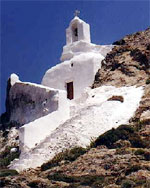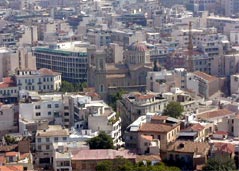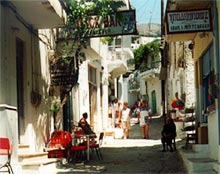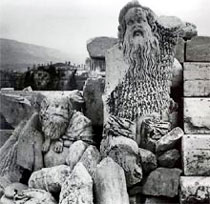|
|
|
|
Top Greece Destinations:
Athens hotels Santorini hotels Rhodes hotels Corfu hotels Heraklion hotels See more hotels in Greece
World Destinations:
 Guides » Greece » "Greece, Warm and Sunny" Guides » Greece » "Greece, Warm and Sunny""Greece, Warm and Sunny"
Greece is a magnificent country that is so hard to describe on paper simply because the water, the architecture, the people, and the culture are truly incredible. The legacy of Greece is like none other. From hints of ancient days to belly dancing and colorful costumes to sacred islands, you will fall in love with Greece and all it has to offer. Although you will notice the whitewashed buildings, blue seas, and golden tanned bodies, the tradition of the people is what tugs on the heartstrings.
Keep in mind that when it comes to fun, the Greeks are the best but they also believe strongly in ancient tradition. Greece has a population of just over 10 million people, with 3.7 million living in the capital city of Athens. From 3000 to 1200 BC, the Bronze Age, Cycladic, Minoan, and Mycenaean maritime civilizations thrived. However, the Bronze Age was also a time of war and violence specific to rivalries over trade.  By the 11th century, the Mycenaean and Minoan cultures had fallen apart, primarily from change in trade practices, along with an invasion from the north by the Dorian. This particular attack brought with it a dark age for Greece that was extremely difficult. In 800 BC, new rivals began regarding military and culture with the two most powerful being Sparta and Athens. From this point, the country experienced immense prosperity, which later became known as the “classical age”. It was at this time that Sophocles wrote “Oedipus the King”. However, with the eruption of the Peloponnesian Wars starting in 431 AD, the classical age ended. By the 11th century, the Mycenaean and Minoan cultures had fallen apart, primarily from change in trade practices, along with an invasion from the north by the Dorian. This particular attack brought with it a dark age for Greece that was extremely difficult. In 800 BC, new rivals began regarding military and culture with the two most powerful being Sparta and Athens. From this point, the country experienced immense prosperity, which later became known as the “classical age”. It was at this time that Sophocles wrote “Oedipus the King”. However, with the eruption of the Peloponnesian Wars starting in 431 AD, the classical age ended.
Unfortunately, the Spartans were so busy fighting the war that they failed to notice Philip of Macedon was expanding his kingdom, moving further into the north. With this, he was able to take control over many of the cities and states that had been weakened. Philip’s son, Alexander the Great, was not as cunning as Philip was but he too was a powerful man. Then the Macedonian Empire came around, lasting three dynasties after Alexander the Great had died at the age of 33. This period was called the Hellenistic period because Greek ideology and culture were merging. From that time until 1453, Greek experienced Roman incursions, the Roman Empire being merged into Eastern and Western empires, the country becoming an important part of the Byzantine Empire, and many crusades being fought while Byzantine power was reduced. However, in 1453, the Turks had come to capture the Byzantine capital, meaning that by 1500, just about all of the Greek had been forced under the control of the Turkish. The area of Greece that we know today was a rural area, with a large number of intellects, merchants, and artists fleeing into central Europe. Then during World War II, the country fought with allies, occupying Thrace. However, once the war ended, Venizelos, the current Prime Minister, sent in a number of forces to help liberate the Turkish territory of Smyma, which is today’s Izmir. At that time, Smyma had a large number of Greeks but the army sent in was repulsed by Ataturk troops, and sadly, far too many Greeks were killed. The result was a huge change in population between the Turkish and the Greek in 1923, which only added more strain on Greece’s already struggling economy. To accommodate all the newcomers, shantytowns were established and unions were formed. Then by 1936, the Communist Party had significant support. At this same time, a new prime minister was appointed who quickly formed a fascist dictatorship. This new leader did not support Italian or German domination, refusing to allow any of the Italian troops to cross over Greece. However, even with allied help, Greece still fell to Germany in 1941. Sadly, this was a huge downfall for Greece, leading to mass starvation and resistance movements springing up all over. Then during the Civil War, tremendous financial support was offered by the United States, helping with the implementation of the Certificate of Political Reliability that was in existence until 1962. From that time forward, Greece continued to go through leadership changes, leadership assassination attempts, and tension with Turkey. However, in 1981, Greece joined the European Community but still there was unrest in the country, primarily from a political perspective. Even so, the good news is that Greece has begun to grow and thrive under the European Union and in 2004, hosted the Olympic Games, which actually began in Greece in 776 BC! Sitting in the southern part of the Balkan Peninsula, Greece neighbors Albania, Bulgaria, and the former, Yugoslav Republic of Macedonia to the north, and Turkey to the east. The peninsula is surrounded by over 1,400 islands with 169 of these being inhabited. These islands are also broken into six groups that include the Lonians, Dodecanese, Cyclades, Sporades, Saronic Gulf, and Northeastern Aegean. Crete and Evia are the largest of all the islands, which are separate from the groups. As you look at the land of Greece, you will find that approximately 80% is mountains, most reaching levels of 4,920 feet. Then in the northern part of the country are massive forests but with forest fires, loggers, and goats, a good portion has been destroyed. With so much mountain region, you can imagine the abundance of flora. In fact, experts estimate that more than 6,000 species exist, some that grow nowhere else in the world. Of these, orchids grow everywhere and in about 100 different varieties. You will also see beautiful roses, poppies, lilies, crocuses, irises, and even herbs growing along the countryside. Wildlife is also in abundance up in the mountains to include bears and wolves. From the sea, you will see dolphins and porpoises playing and often, chasing boats as they put on a display of acrobatics. Interestingly, if you visit the waters around Kefallonia and Zakynthos, you will see a huge colony of sea turtles, the last of their kind in all of Europe. The babies will actually hatch on the warm sand and ten make their way back into the ocean. However, some do not make it to the water, being trampled by cars and people, or picked up by other animals as a snack. The rarest of all seal species is also found in Greece. This monk seal is one of six endangered species and it is estimated that today, only 400 still exist with about 50% of those in this country.  If you plan to visit Greece during the summer months, be prepared for numerous Greek dramas held in the same ancient theaters where original dramas were held. Throughout Greece’s history, poetry, literature, philosophy, and drama have played out with famous names such as Plato, Aristotle, and Socrates. Today, these things are still very important aspects of the culture but you will also see a new scene in visual arts, blended perfectly with traditional crafts to include weaving, tapestry, and embroidery. If you plan to visit Greece during the summer months, be prepared for numerous Greek dramas held in the same ancient theaters where original dramas were held. Throughout Greece’s history, poetry, literature, philosophy, and drama have played out with famous names such as Plato, Aristotle, and Socrates. Today, these things are still very important aspects of the culture but you will also see a new scene in visual arts, blended perfectly with traditional crafts to include weaving, tapestry, and embroidery.
Of course, the Greeks have a real passion for music, although for years, Rembetika, which was a type of music that spoke of tragedy, poverty, and suffering, was banned. However, the younger generation is again picking it up and enjoying it. While all of these things are fascinating and respected, the Greek language is what most people find incredible. As the oldest European language, having been spoken for more than 4,000 years and written for over 3,000 years, you cannot help but be awestruck by the huge vocabulary. Now, many European countries offer delectable foods but until you have tasted Greek food, you have not truly enjoyed the finest. For starters, they make a mean Souvlaki, which is grilled meat on a skewer that is served in pita bread, or Spanakopita, spinach and cheese pie that is incredible. Other dishes loved by locals and visitors alike include Mousakas, which is eggplant that has been baked with minced meat and béchamel sauce, freshly grilled seafood, and stuff tomatoes. However, the pastries of Greece are to die for, such as everyone’s favorite, Baklava, a puff pastry with nuts and honey. Between the history, the rich and diverse culture, the dancing, and the food, and of course, the colorful and exciting events, and festivals, you will want to go back time after time. This country is magical and absolutely, beautiful. Whether traveling alone or with a family, you will be glad you made Greece your destination choice. Last Updated: 10/19/2006 3:14:00 PM Mode articles for Greece While there are many historical and exciting cities in Greece, the capital city of Athens is probably the most fascinating of them all. Without doubt, Athens, Greece has had a glorious past but far too often, people
While there are many historical and exciting cities in Greece, the capital city of Athens is probably the most fascinating of them all. Without doubt, Athens, Greece has had a glorious past but far too often, people ... continue >>  Crete is the southernmost island in Europe and a beautiful place to visit. The great thing about Crete is the diversity, which is seen in the mountain villages, exciting nightlife, pristine sandy beaches, rocky bays,
Crete is the southernmost island in Europe and a beautiful place to visit. The great thing about Crete is the diversity, which is seen in the mountain villages, exciting nightlife, pristine sandy beaches, rocky bays, ... continue >>  Greece is a country that has exported chaos, tragedy, drama, and even democracy well before most other nations. This magnificent country boasts rich, ancient culture, massive mountain ranges, incredible food, warm-
Greece is a country that has exported chaos, tragedy, drama, and even democracy well before most other nations. This magnificent country boasts rich, ancient culture, massive mountain ranges, incredible food, warm-... continue >> |
|
| | |
|
©2026 HotelsRu.com About us Privacy Site map Greece, Warm and Sunny |
|
 Look for deals on hotels?
Look for deals on hotels?